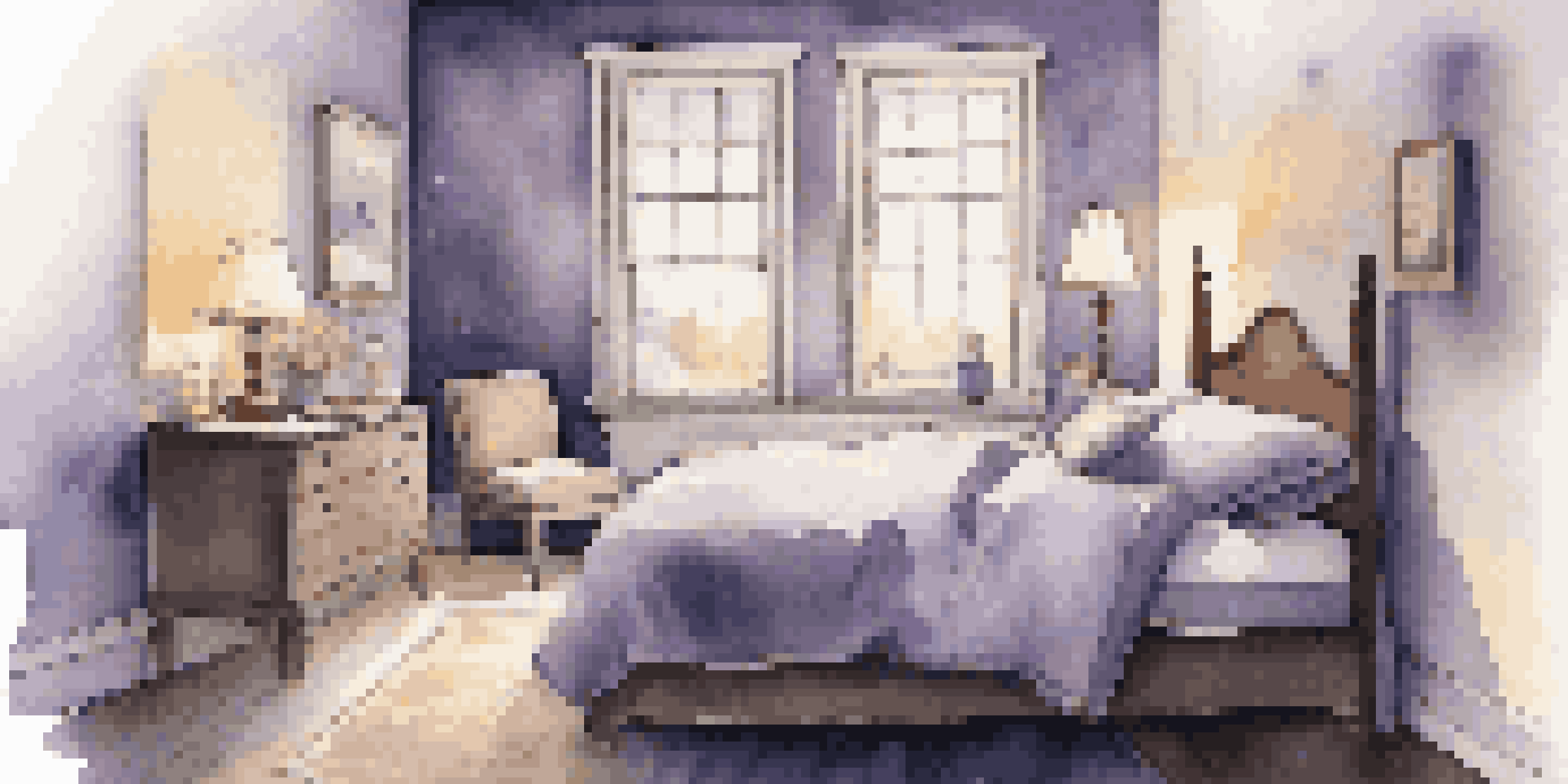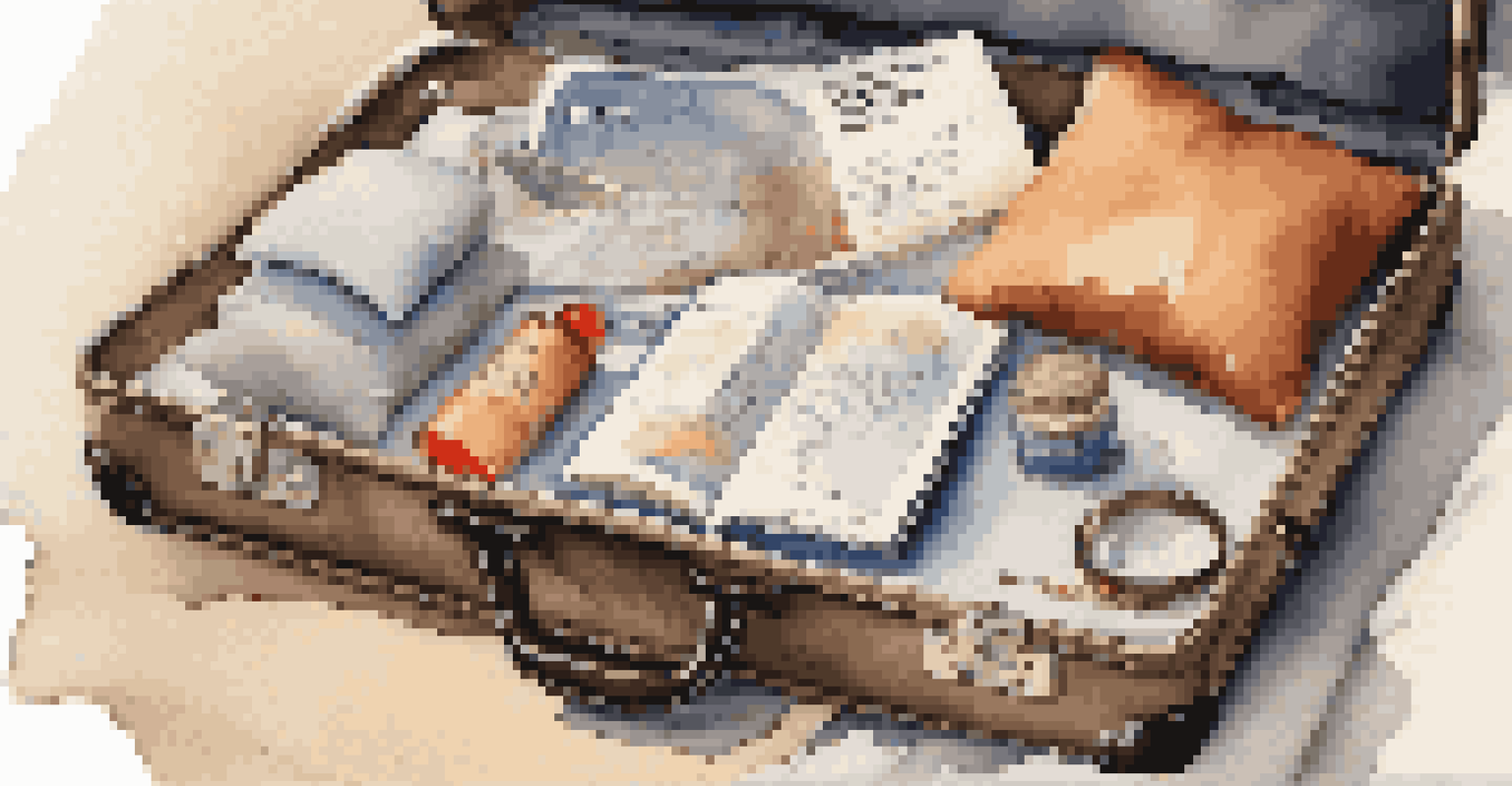Sleep Tips for Better Health While Traveling

Prioritize Sleep Before Your Trip for Better Travel Health
Before you even pack your bags, prioritize getting quality sleep in the days leading up to your trip. This can help boost your energy levels and immune system, making you less susceptible to travel fatigue. Think of it as charging your batteries; the more fully charged you are, the longer you can enjoy your adventures.
Sleep is the best meditation.
Establish a consistent sleep schedule, going to bed and waking up at the same time each day. This helps regulate your body's internal clock, making it easier to adapt to new time zones later. Consider using blackout curtains or white noise machines to create an optimal sleep environment at home, so you can rest well before you go.
Lastly, don’t underestimate the power of relaxation techniques. Simple practices like deep breathing, stretching, or meditation can calm your mind and prepare your body for a restful night's sleep, setting you up for a successful trip.
Choose Your Accommodation Wisely for Sleep Quality
When booking accommodations, consider factors that contribute to a good night's sleep. Look for hotels or rentals that prioritize comfort, such as quality mattresses and soundproofing. A peaceful environment can make a world of difference, especially if you're in a bustling city or near busy streets.

Additionally, don’t hesitate to read reviews that specifically mention sleep quality. Travelers often share insights about noise levels, comfort, and overall ambiance. By choosing a place that caters to good sleep, you're investing in your health and happiness while away from home.
Prioritize Sleep Before Traveling
Getting quality sleep before your trip boosts your energy levels and immune system, helping you avoid travel fatigue.
Finally, always check the amenities that can enhance your sleep, like blackout curtains or quiet air conditioning. The little details can add up to a more restful experience, allowing you to wake up refreshed and ready to explore.
Manage Jet Lag by Adjusting Your Sleep Schedule
Jet lag can be a traveler's worst enemy, disrupting your sleep and affecting your mood. To combat this, start adjusting your sleep schedule a few days before your trip. If you’re traveling east, try going to bed and waking up an hour earlier; if west, do the opposite. This gradual shift can help your body adapt more easily to the new time zone.
The shorter the sleep, the longer the dream.
During travel, make strategic use of sleep. If the flight is long, take short naps but avoid sleeping too much, as it can lead to greater fatigue upon arrival. You want to arrive at your destination feeling energized, not groggy.
Once you’ve arrived, expose yourself to natural light during the day. This helps reset your internal clock and signals to your body when it’s time to be awake and when it’s time to sleep, making it easier to adjust to your new schedule.
Create a Relaxing Sleep Routine While Traveling
Establishing a calming bedtime routine is crucial, even when you're away from home. This might include activities like reading a book, listening to soothing music, or practicing gentle yoga stretches. These rituals signal to your body that it’s time to wind down, promoting better sleep quality.
Consider incorporating familiar items into your travel kit, such as a favorite pillow or a sleep mask. Familiarity can help create a sense of comfort in unfamiliar environments. It’s like bringing a piece of home with you, which can be incredibly soothing.
Choose Comfortable Accommodations
Selecting lodging with quality mattresses and soundproofing ensures a better sleep experience during your travels.
Lastly, avoid screens at least an hour before bed. The blue light emitted from phones and laptops can disrupt your body’s production of melatonin, the hormone that regulates sleep. Instead, opt for low-light activities that help you relax and prepare for a night of restorative sleep.
Mind Your Diet: Foods and Drinks That Affect Sleep
What you eat and drink while traveling can significantly impact your sleep quality. Avoid heavy meals close to bedtime, as they can cause discomfort and disrupt your sleep cycle. Instead, opt for light snacks that include sleep-promoting ingredients like bananas, almonds, or yogurt.
Caffeine is another sneaky culprit that can keep you awake. Be mindful of your caffeine intake, especially in the afternoon and evening, as it can linger in your system longer than you might think. Choosing herbal teas or decaffeinated options in the evening can help you wind down.
Lastly, alcohol may seem like a good idea for relaxation, but it often leads to disrupted sleep patterns. While it might help you fall asleep faster, it can affect the quality of sleep. Moderation is key, and it’s wise to limit your intake if you want to wake up feeling refreshed.
Stay Active: The Connection Between Exercise and Sleep
Incorporating physical activity into your travel routine can boost your sleep quality immensely. Whether it's an early morning jog, a hike, or even a dance class, staying active helps reduce stress and anxiety, paving the way for better sleep. Think of exercise as a natural sedative that can help you unwind after a long day of exploration.
Aim for at least 30 minutes of moderate exercise most days, but be mindful of timing. Exercising too close to bedtime can have the opposite effect, energizing you rather than calming you down. Instead, try to fit your workouts in earlier in the day or during the afternoon.
Establish a Relaxing Routine
Creating a calming bedtime routine, even while traveling, signals to your body that it's time to wind down for restorative sleep.
Lastly, exploring your destination through physical activities can be a fun way to experience new places. Walking tours, biking, or even swimming in the hotel pool not only keep you fit but also contribute to a more restful night’s sleep.
The Importance of a Comfortable Sleep Environment
Creating a comfortable sleep environment while traveling can greatly enhance your ability to rest well. Make sure your sleeping area is dark, quiet, and cool. If your accommodation doesn’t offer these conditions, consider using earplugs, sleep masks, or even a portable fan to create your ideal atmosphere.
Additionally, don’t forget about your bedding. If possible, request extra pillows or blankets that can make your sleeping situation more comfortable. Sometimes, a small adjustment can make a big difference in how well you sleep.

Lastly, personalizing your space can help too. Bring along a small item that reminds you of home, like a favorite blanket or a pillow spray with calming scents. These small touches can create a sense of security, making it easier for you to drift off into a peaceful slumber.